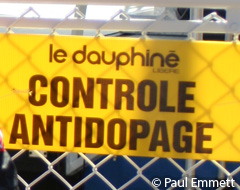Former World Champion reacts to two-year ban & €35,000 fine stemming from biological passport
 Spain’s Igor Astarloa refuses to pay a €35,000 fine and maintains he is innocent despite receiving a two-year doping ban.
Spain’s Igor Astarloa refuses to pay a €35,000 fine and maintains he is innocent despite receiving a two-year doping ban.
“It seems absurd,” the former World Champion told Basque newspaper Deia yesterday. “I stopped racing after the Vuelta a Asturias in 2009, but in this sport it seems that they won’t give you any peace even if you are retired. Could you just give me this?
“I am not worried because they cannot stop from racing since I have already stopped, but it is annoying to continue with this because it is unfair. I took thousands of controls at all times, everywhere, and never gave positive.”
The International Cycling Union (UCI) announced yesterday that the Spanish Cycling Federation (RFEC) sanctioned Astarloa with a two-year ban and a €35,000 fine. Astarloa, Pietro Caucchioli, Francesco De Bonis, Ricardo Serrano and Rubén Lobato were the first five cyclists the UCI caught with its biological passport. On June 17, 2009, the UCI announced that it provisionally suspended them.
The UCI introduced the biological passport in January 2008 as a means to signal doping without a traditional positive test. Scientists are able to recognise irregularities by plotting blood and urine readings over time.
Astarloa won the World Championships in Hamilton, Canada, and the Belgian classic Flèche Wallonne in 2003. In 2006, he won the Milano-Torino. He joined Amica Chips for 2009 and participated in his last race on May 2, 2009.
Astarloa said Amica Chips was unable to pay and so he will refuse to pay the €35,000 fine, a percentage of his salary.
“That’s ridiculous. How will I pay a portion of a wage that I never collected? UCI knows well enough that the team did not pay me or any of the team members, and that was the reason the team disappeared.”
Amica Chips disbanded mid-way into last year’s season. In January, Astarloa announced that he retired from cycling. He said yesterday that he has no plans of appealing RFEC’s decision to the Court of Arbitration for Sport (CAS) because it is “a very costly way and not leads you to nothing.”
Italy’s Caucchioli received a two-year suspension on June 3, 2010, from his national federation, but recently announced he would appeal the decision to the CAS. He was encouraged by the cases of Italian Franco Pellizotti and Slovenian Tadej Valjavec. Their national federations ruled that there was insufficient evidence of doping from the biological passport’s findings and shelved the cases.
The UCI has appealed the decision of the Slovenian Federation to the CAS.